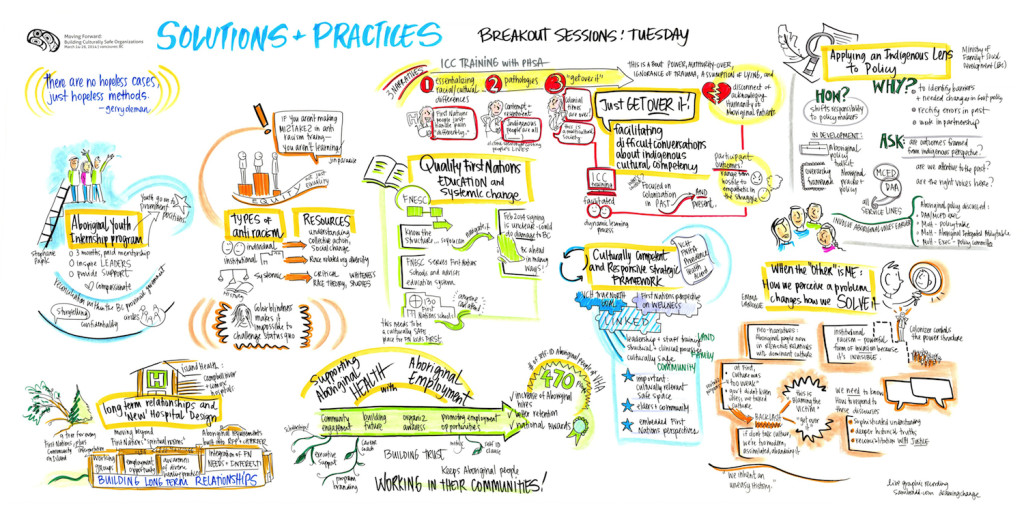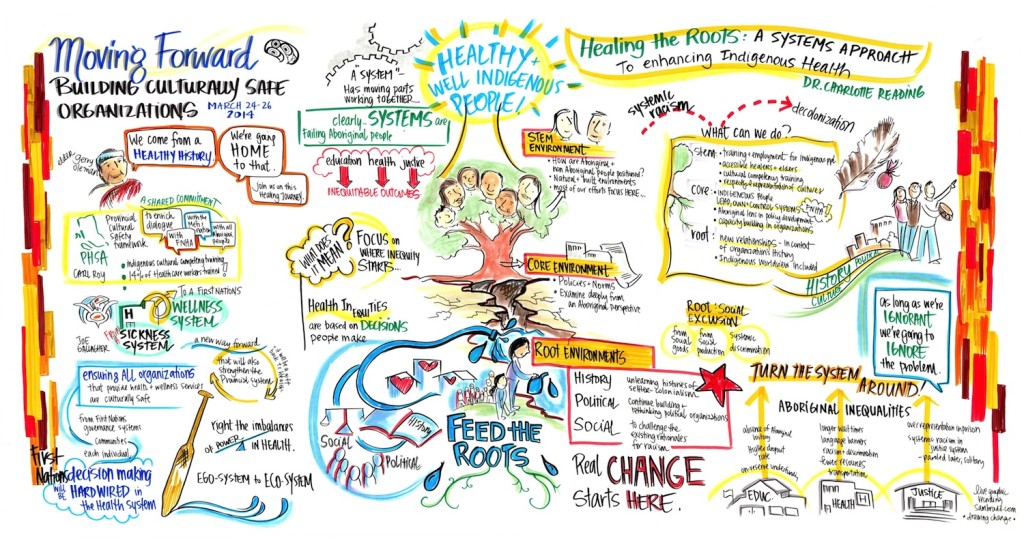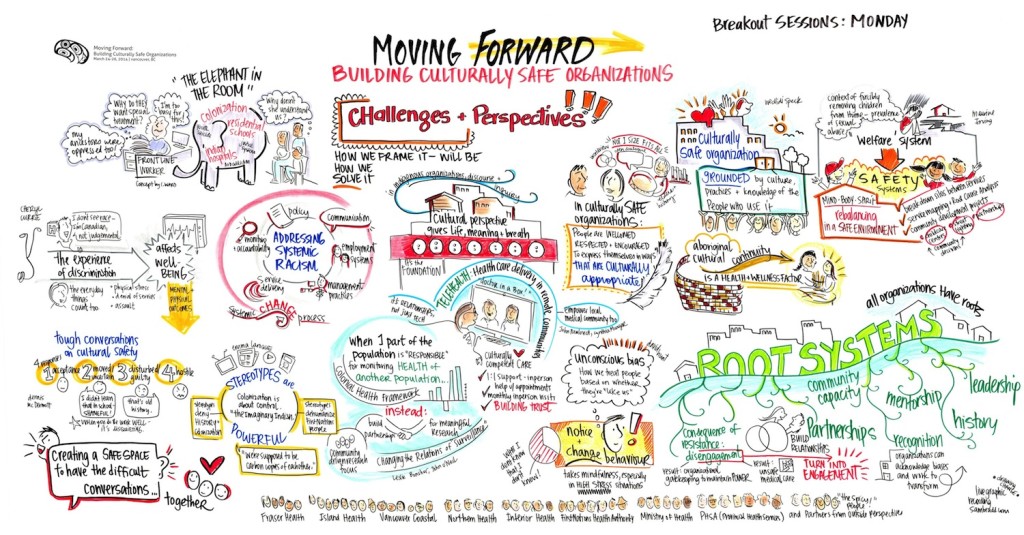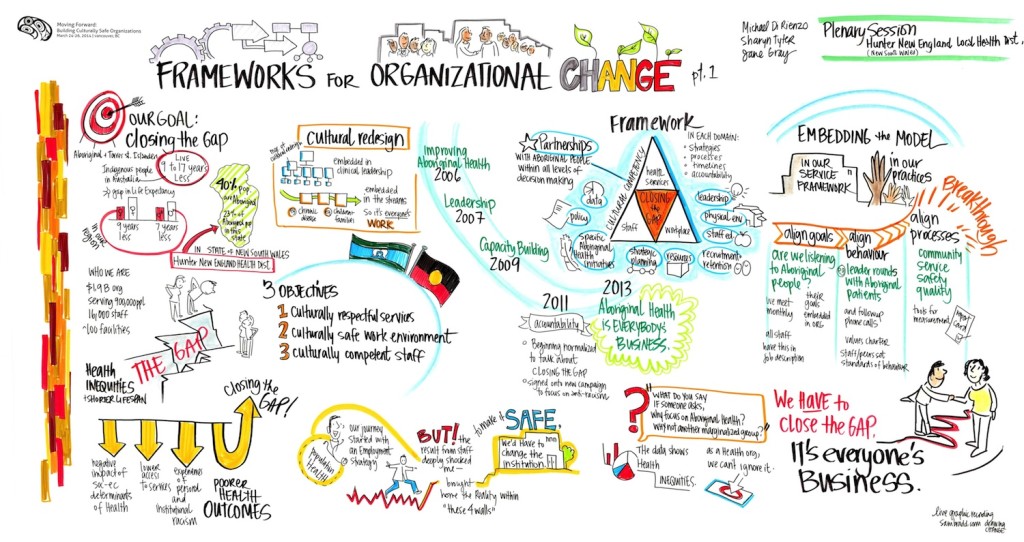Visuals for Indigenous cultural competency framework
Visuals can support conversations about Indigenous cultural competency frameworks in health care.
Recently, I worked at the Moving Forward conference, a unique gathering held by the Provincial Health Services Authority. I came away from this experience profoundly changed, as I always do when work takes me to a deep place. Graphic recording visuals brought a unique dimension to tough conversations about racism, colonialism and dismantling inequities in health.
See all of the images here: http://www.culturalcompetency.ca/moving-forward/graphic-recording
Here are six ways graphic recording visuals made an impact at the conference, and some self-reflection on how I approached this work.
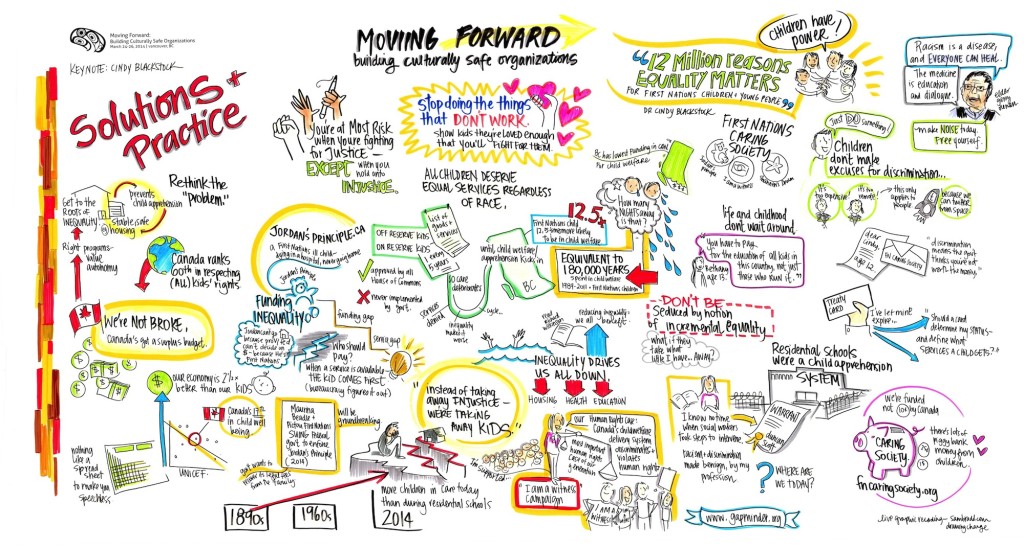 1. Graphic recordings summarized the breakout sessions. There were four or five concurrent sessions, and no one wants to ‘miss out’ on great content. The visuals summarize the breakout sessions into one image. A team of note-takers designed a system to gather information for me. The graphic recordings complement the Powerpoint posted online post-conference.
1. Graphic recordings summarized the breakout sessions. There were four or five concurrent sessions, and no one wants to ‘miss out’ on great content. The visuals summarize the breakout sessions into one image. A team of note-takers designed a system to gather information for me. The graphic recordings complement the Powerpoint posted online post-conference.
2. The graphic recordings are a legacy to share. The visuals keep the conversation going. A whole team can’t always attend a conference, but sharing graphic recordings through email, internal newsletters and websites can spark conversations, not to mention how they’re social-media friendly.
3. The graphic recordings honor the changes in the group’s facilitated discussion. The plenary discussion captured on Day 3 compared to Day 1 is profoundly different. The group shifted from what I would call “friendly” group work on Day 1 to a profound sharing during plenary and deep engagement on Day 3. The graphic recordings honour this shift as part of the group’s arc, instead of visualizing just the result.
4. Graphic recordings emphasize and reinforce the presentations and panels. Keynote speakers were invited from near and far to this conference. Graphic recordings are an opportunity to reinforce and share their knowledge with a poster devoted to each. Graphic recordings can honour their ideas using details that help engage others, especially visual learners.
5. Graphic recording walls are a place to reflect and engage. For this conference, we ended up with 9 8-foot posters hung up on the walls. People naturally gravitated to them as a place to read, reflect, make suggestions to me and talk to each other.
6. Graphic recording can support us in processing topics that make us uncomfortable. A skillful graphic recorder can be trusted to follow the facilitator and group. Even if there is conflict or challenging topic, they are ready to go deep with the group. This means abandoning prescribed templates/structures if the group takes a left turn in favour of new breakthroughs. Graphic recordings can document the groups’ changes in wrestling with complex ideas. In this way the images avoid superficiality that glosses over the process of thinking and learning.
My responsibility with the pens is to honour what’s said, and make it visible. I’m also attuned to what’s left unsaid in the room.
As a white Canadian, I believe it’s my responsibility to know more histories than what’s taught in schools, including how to unpack the histories of Canada that mask ongoing systemic racism and colonization. It’s not an us/them situation. Racism and colonization are about all of us. And so I arrived at this conference prepared intellectually, as much as that can ever prepare me for being present in mind, heart and body.
I was also ready emotionally, ready to be a graphic recorder bearing witness. While I’m recording, words and images flow through me and onto the page. I listened and synthesized presentations about systems change – and also listened to peoples’ stories about the trauma of racism, as well as stories of resilience, transformation, and successes (which can be just as emotional!) in building Indigenous cultural safety frameworks. I gathered support from being in the presence of elders and conference participants, reflecting on the great privilege I had to learn from everyone.
Director of Aboriginal Health for PHSA, Leslie Varley writes in the conference guide,
“The next steps require collective heavy lifting. We urgently need to begin dismantling structural inequities within health authorities. These can be tough and unsettling negotiations for change. The old status quo of marginalized Aboriginal health, delayed and denied services, misdiagnosis and malpractice due to racism, stereotyping, prejudice is no longer acceptable. Systemic racism within services, policy and structure must be replaced with equitable policy, practice, and structures.”
Dominant narratives about Aboriginal health are challenged in the PHSA’s online Cultural Competency Training Program, an award-winning initiative led by Cheryl Ward. The ICC has reached 14% of BC’s healthcare workforce. Learn more about the ICC’s work here.
With a bold vision for change and compelling reasons to “Close the Gap” (as our Australian friends say) between indigenous and non-indigenous health outcomes, this conference was a powerful gathering.
